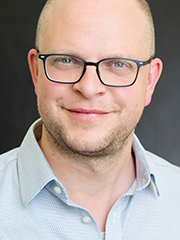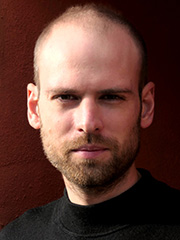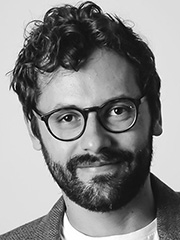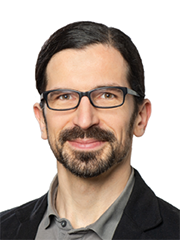Alumni
Dr. Lukas Bäuerle
|
Copyright: L. Bäuerle |
Academic Career
Memberships
-
European Association for Evolutionary Political Economy (EAEPE)
-
DiscourseNet − International Association for Discourse Studies
-
Gesellschaft für sozioökonomische Bildung und Wissenschaft (GSÖBW)
- World Interdisciplinary Network for Institutional Research (WINIR)
-
Netzwerk Plurale Ökonomik (Gründungsmitglied)
-
Economists 4 Future in Germany, Austria and Switzerland (founding member)
-
stsing. Doing STS in and through Germany
Scholarships and Awards
-
2023: Young Academy Fellow in die Akademie der Wissenschaften in Hamburg
-
2022: GSÖBW Elinor Ostrom Award 2022 for my doctoral thesis
-
2022: Laura Bassi Scholarship
-
2019-2022: Doctoral scholarship from the Hans Böckler Foundation
-
2011-2012: DAAD scholarship for an internship in La Paz, Bolivia
Publications (Selection)
- Bäuerle, Lukas; Graupe, Silja (2024): Enacting Economic Transformation. The Transformative Economic Capabilities (TEC) approach. In: World Futures (online first).
- Schlaile, Michael; Hector, Veronica; Peters, Luis; Bäuerle, Lukas; Smith, Beth; Hilt; Annette; Graupe; Silja (2024): Innovation Amidst Turmoil: A SenseMaker Study of Managerial Responses to the COVID-19 Crisis in Germany. In: Journal of Innovation Economics and Management 43(1), 285-318.
- Bäuerle, Lukas (2023): Transformation, Agency and the Economy. The case for a Grounded Economics. Economics and the Humanities. London: Routledge.
- Bäuerle, Lukas; Graupe, Silja (2023): Die Spirale transformativen Lernens. In: Forschungsdiskurs und Etablierungsprozess der Organisationspädagogik, hrsgg. Von Heidelmann, Marc-André; Storozenko, Victoria und Wieners, Sarah. Wiesbaden: Springer VS, p. 223-241.
- Bäuerle, Lukas (2021): Beyond indifference – an economics for the future. In: Fullbrook, Edward; Morgan, Jamie (Eds.): Post-Neoliberal Economics. Bristol: World Economics Association, p. 175-208.
- Bäuerle, Lukas; Hantke, Harald; Schröder, Lisa-Marie und Urban, Janina (2021): Wirtschaft neu lehren – Eine Einleitung. In: Urban, Janina; Schröder, Lisa-Marie; Hantke, Harald und Bäuerle, Lukas (Eds.): Wirtschaft neu lehren. Erfahrungen aus der pluralen sozioökonomischen Hochschulbildung. Wiesbaden: Springer VS, p. 1-16.
- Bäuerle, Lukas (2020): Reproduzieren, Dekonstruieren, Imaginieren. Ein existenzpädagogischer Blick auf (mögliche) Konventionen ökonomischer Bildung. In: Jenseits der Konventionen: Alternatives Denken zu Wirtschaft, Gesellschaft und Politik. Eine Festschrift für Walter O. Ötsch, editors: Pühringer, Stephan; Graupe, Silja; Hirte, Katrin; Kapeller, Jakob and Panther, Stephan. Marburg: Metropolis, p. 337-370.
- Bäuerle, Lukas (2020): An essay on the putative knowledge of textbook economics. In: real-world economics review no. 91: p. 53-69.
- Bäuerle, Lukas; Pühringer, Stephan und Ötsch, Walter Otto (2019): „Ohne Effizienz geht es nicht.“ Ergebnisse einer qualitativ-empirischen Erhebung unter Studierenden der Volkswirtschaftslehre. In: FGW-Studien Neues ökonomisches Denken 13, editors: van Treeck, Till und Urban, Janina. Düsseldorf: FGW.
- Bäuerle, Lukas (2017): Fohrmann, Oliver: Im Spiegel des Geldes. Bildung und Identität in Zeiten der Ökonomisierung. Rezension. In: Sociologia Internationalis 55 (2): p. 310-312.
- Bäuerle, Lukas ([2013] 2017): Clockwork Economics. Ontologische Grundlagen in der Ökonomik. Bayreuth: Bachelor Thesis, University of Bayreuth.
- Bäuerle, Lukas; Behr, Maria und Hütz-Adams, Friedel (2011): Im Boden der Tatsachen. Metallische Rohstoffe und ihre Nebenwirkungen. Bonn: Brandt GmbH.
Dr. Benjamin Lipp
|
Copyright: B. Lipp |
Research and Work Focus
- Science and technology research
- Digitalization and ageing
- Neurosciences and technologies
- Governmentality studies
- Innovation research, innovation policy
- User research and co-creation
Academic Career
2021-2024
Marie Curie Postdoctoral Fellow at the University of Hamburg and the Cornell University, Project REGAIN
2018-2021
Researcher in the EU-funded project "Scaling up Co-creation. Pathways and challenges for socially robust innovation in Europe" (SCALINGS) under the leadership of Prof. Sebastian Pfotenhauer
2016-2021
Lecturer in the Elite Master's Program “Neuroengineering” at the Technical University of Munich (TUM)
2014-2019
PhD in TechnoScienceStudies at the Munich Center for Technology in Society (MCTS) at the Technical University of Munich (TUM)
2013-2021
Research Assocaite at the Friedrich Schiedel Endowed Chair for the Sociology of Science at the Technical University of Munich (TUM)
2013
University degree in sociology, economics and criminology at the Ludwig Maximilian University of Munich (LMU)
Courses
Prototyping Neuro-Futures Through Science/Fiction (annual election seminar TUM)
Lectures
- Reconfiguring Life Under the Techno-Political Condition.The Cases of Social Robotics and Neuro-Engineering, at 4S + EASST Joint Conference, Prague, August 19, 2020
- Co-creation with whom? Configuring ‘the public’ in innovation procurement between co-design, democracy, and the market, at 4S + EASST Joint Conference, Prague, August 19, 2020
- Techno-Politics of Pre-Commercial Procurement. A Case Study in Healthcare Robotics, at 4S Annual Meeting, New Orleans, September 7, 2019
- The Techno-Politics of (Gerontechnological) Innovation. The European Case of RobotCare, at 3rd International Workshop on Socio-Gerontechnology, June 18, 2019
- Techno-Politics of Innovation. The (European) Case of RobotCare, at the NSF-DFG Joint Workshop ‘Technoscientific Constitutionalism’, Washington, DC, February 8, 2019
- Robot assistance. The interfacing of robotics and care in European innovation politics, at the 2nd International Workshop on Socio-Gerontechnology. Unsettling Technogenarians, Universitat Oberta de Catalunya, Barcelona, June 21, 2018
- Genealogie der Pflegerobotik. Zur materiell-diskursiven Verschaltung von Robotik und Pflege im Kontext europäischer Innovationspolitik, at the conference ‘Genese und Folgen der Pflegerobotik’, Institut für Soziologie, TU Berlin, Dezember 7, 2017
- Autonomous Robots – Independent Living. On the Interfacing of Robot Care in European Innovation Politics, at the Social Informatics Meeting, University of Edinburgh, September 22, 2017
- Interfacing Robot Assistance: Robots for Care – Caring for Robots, talk at the workshop ‘Living with technology’, Academisch Medisch Centrum (AMC), Amsterdam, April 4, 2017
- Techno-Politics of Robot Care. On the Interfacing of Care Environments and Robotics Within European Innovation Politics, talk at STS Italia Conference, University of Trento, Italy, November 24, 2016
- Prototypische Milieus. Zur Erprobung von Sozialität und Technizität in der Sozialrobotik, talk at the Biannual Meeting of the German Society of Sociology (DGS), Otto Friedrich University, Bamberg, October 30, 2016
- Pflegende Roboter – Robotisierte Pflege. Zu einer Analytik des Interfacing, talk at the Biannual Meeting of the German Society of Sociology (DGS), Otto Friedrich University, Bamberg, October 29, 2016
- Caring for Robots. Some Reflections on Care in a Techno-Scientific World, talk at the conference ‘Living in Technoscientific Worlds’, organised by STS Austria, University of Vienna, December 4, 2015
- Social Robot(ic)s in the Making. Interfacing Praxis and the Question of Interactivity, talk at the Annual Meeting der Society for Social Studies of Science (4S), Denver, CO, November 14, 2015
- Installing Interfaces. A Videography of Human-Robot-Interaction, talk at the Intellectual Party Summer Conference, Lancaster, UK, June 29, 2015
- Assembling the Interface of Social Robotics, talk at the WTMC Workshop ‘Robots!’, Ravenstein, Netherlands, April 23, 2015
- Einführung: Die neuen Materialismen und die Soziologie. Materialität, Hybridität, Relationalität, talk at the Biannual Meeting of the German Society of Sociology (DGS), Trier, October 7, 2014, with Katharina Hoppe
Conferences and Workshops
- August 2020 Organisation of two panels on ‘Situating Co-creation: Innovation between Local Specificity and Scalable Standardization’ and on ‘The Configurations of ‘The Public’ in Innovation’ at the EASST + 4S Joint Conference in Prag
- March 2020 Organisation of the workshops ‘Public Procurement of Innovation’, at the Technical University of Denmark (DTU) within the context of the project SCALINGS, with Federica Pepponi, Carlos Cuevas-Garcia, Meiken Hansen, Sophie Nyborg
- December 2017 Coordination of the PhD workshop ‘Beyond Interdisciplinarity in Engineering and Social Sciences’ at the Munich Center for Technology in Society (MCTS), TUM
- November 2016 Organisation of the workshops ‘Seeing and Noticing – Video Analysis in Action (IV)’, supported by the Munich Center for Technology in Society (MCTS), TUM, with Andrea Geipel
- January 2016 Organisation of the workshops ‘Sociology and new materialisms’, supported by the Friedrich Schiedel Endowed Chair for the Sociology of Science, TUM, with Katharina Hoppe
- October 2015 Organisation of the MCTS Late Summer School ‘Automation’ at the Munich Center for Technology in Society (MCTS), TUM
- October 2014 Organisation of the panels ‘Sociological perspectives on new materialisms’ at the DGS congress in Trier, with Katharina Hoppe
October 2009 Organisation of the second student sociology congress ath the Ludwig Maximilians Universität (LMU) in Munich, supported by the DGS
Memberships
- European Association for the Study of Science and Technology (EASST)
- Society for Social Studies of Science (4S)
- Deutsche Gesellschaft für Soziologie (DGS)
- DGS Sektion für Wissenschafts- und Technikforschung
- DGS Sektion für Soziologische Theorie
- Association for Science and Technology Studies in Germany (STSing)
- Socio-Gerontechnology Network
Awards
- MSCA Global Individual Fellowship, Projekt ‘Responsible Neuro-Technologies of Pain. Understanding Vulnerability in Pain Care with Minimally and Non-Invasive Neuro-Technologies for Pain Modulation in the United States’ (REGAIN), 2021
- LMU research award for excellent stutends by the Ludwig Maximilians-Universität München for the diploma thesis “Wenn Liebe zum Leiden wird“, 2013
Publications
- Lipp, Benjamin / Maasen, Sabine (2022): Techno-bio-politics. On Interfacing Life with and through Technology. NanoEthics. DOI: 10.1007/s11569-022-00413-2
- Lipp, Benjamin (2022): Caring for robots. How care comes to matter in human-machine interfacing. Social Studies of Science. DOI: 10.1177/03063127221081446
- Lipp, Benjamin / Dickel, Sascha (2022): Interfacing the Human/Machine. Distinktion. DOI: 10.1080/1600910X.2021.2012709
Hergesell, J.; Maibaum, A.; Bischof, A.; Lipp, B. (2021): Zum Potenzial grundlagenwissenschaftlicher Technikforschung für ein »gutes Leben im Alter«. Ein Plädoyer für konsequente partizipative Technikgestaltung. In Frommeld, D.; Scorna, U.; Haug, S.; Weber, K. (eds.): Gute Technik für ein gutes Leben im Alter? Akzeptanz, Chancen und Herausforderungen altersgerechter Assistenzsysteme. Bielefeld: transcript (Alter – Kultur – Gesellschaft), pp. 293-316. - Lipp, B. (2020): Genealogie der RoboterPflege. Zur politischen Rationalität des europäischen Innovationsdispositivs. In Maibaum, A.; Hergesell, J.; Meister, M. (eds.): Genese und Folgen der Pflegerobotik. Weinheim: Beltz Juventa.
- Maibaum, A.; Bischof, A.; Hergesell, J.; Lipp, B. (2021): A Critique of Robotics in Health Care. In AI & Society.
- Lipp, B. (2019): Interfacing RobotCare. On the Techno-Politics of Innovation. Doctoral thesis. Technical University of Munich.
- Lipp, B.; Maasen, S. (2019): Roboter in der Pflege als sozio-technisches Verschaltungsproblem. Theoretische Angebote der Technikforschung an die Pflege(wissenschaft). In Pflege & Gesellschaft 24(3), pp. 206–218.
- Hoppe, K.; Lipp, B. (2017): Editorial. In Katharina Hoppe, Benjamin Lipp (Eds.): Neue Materialismen. In Behemoth 10(1). Freiburg, pp. 2–9.
- Lipp, B. (2017): Analytik des Interfacing. Zur Materialität technologischer Verschaltung in prototypischen Milieus robotisierter Pflege. In Behemoth 10(1). Freiburg, pp. 107–129.
- Hoppe, K.; Lipp, B. (2016): Experiments with “New Materialisms”. Workshop Report on “Sociology and New Materialisms”. In EASST Review 36(1), pp. 30–33.
- Dickel, S.; Lipp, B. (2016): Systemtheorie und Technikkritik. In Möller, K.; Siri, J. (eds.): Systemtheorie und Gesellschaftskritik. Perspektiven der Kritischen Systemtheorie. Bielefeld: transcript (Sozialtheorie), pp. 151–168.
- Lipp, B. (2014): Wenn Vorlieben zum Leiden werden. Eine soziologische Analyse pädophilen Begehrens im Diskurs sexualmedizinischer Primärprävention. In Zeitschrift für Sexualforschung 27(3), pp. 201–219.
Julia Katherina Mahnken
|
Email: julia.mahnken"AT"uni-hamburg.de; julia.mahnken"AT"studium.uni-hamburg.de ORCID: 0000-0001-5067-5987 |
Academic Career
Since May 2025
Consultant for strategic organizational development; FHH
2021-2025
Research Associate at the Chair of Science Studies and Innovation Research, University of Hamburg
2018-2020
M.A. Criminology and police sciences, Ruhr-Universität Bochum
1999-2002
Certified public administrator
Publications
- Mahnken, Julia Katherina (2022): Digital Transformations in Drug-Related Crime: Figurations, Interdependencies, and Balances of Power. In: Historical Social Research, 47, 2022, 3, 261-290. https://doi.org/10.12759/hsr.47.2022.33
- Mahnken, Julia Katherina (2021): Unter dem Einfluss der digitalen Transformation. Wie die Technikbetroffenheit die Polizei verändert. In: Arzt, Clemens et al. (Hrsg.): Perspektiven der Polizeiforschung: 1. Nachwuchstagung Empirische Polizeiforschung – 4./5. März 2021. [In Zusammenarbeit mit Arbeitskreis Empirische Polizeiforschung, Forschungsinstitut für öffentliche und private Sicherheit der Hochschule für Wirtschaft und Recht Berlin (FÖPS Berlin), Sächsisches Institut für Polizei- und Sicherheitsforschung (SIPS)]. Berlin, p. 161-183. DOI: https://doi.org/10.4393/opushwr-3370
- Bidlo, Oliver/ Mahnken, Julia Katherina (2021): Digitale und gesellschaftliche Transformation. Polizeiwissenschaft mit Norbert Elias. In: Kühne, Eberhard/ Liebl, Karlhans (Hrsg.) (2021): Polizeiwissenschaft. Fiktion. Option oder Notwendigkeit? Polizei & Wissenschaft. Verlag für Polizeiwissenschaft, Frankfurt a.M., ISBN: 978-3-86676-669-3
- Mahnken, Julia Katherina (2020): Auswirkungen der digitalen Transformation für die Aufgaben und Ausrichtung der Kriminalpolizei. Wie die Technikbetroffenheit die Kriminalpolizei verändert. Figurations- und prozesssoziologische Analyse in den Polizeiwissenschaften. Polizei & Wissenschaft. Verlag für Polizeiwissenschaft, Frankfurt a.M., ISBN: 978-3-86676-672-3
Memberships
- European Society of Criminology
Projects
- Project “Skills a la carte“, approved by the AG “Digitale Lehre“ of the Faculty of Economics and Social Studies, University of Hamburg (Winter Term 2022/23 – Summer Term 2023)
Lectures
- “Online Drug Trafficking: Disruptions, novelties or socio-technic (recon)figurations? Methodological considerations & empirical illustration“, 5. International Human Factor in Cybercrime Conference , 10.-12.09.2023, Halle (Saale). https://kripoz.de/2024/05/31/5-annual-human-factor-in-cybercrime-conference/
- “Auswirkungen der digitalen Transformation für die Aufgaben und Ausrichtung der Kriminalpolizei. Wie die Technikbetroffenheit die Kriminalpolizei verändert. Figurations- und prozesssoziologische Analyse in den Polizeiwissenschaften.“ Nachwuchstagung Empirische Polizeiforschung am 4. und 5. März 2021 (virtuell), Panel 4: Cybercrime / Ermittlung. FÖPS, Berlin
Dr. Nils Matzner
|
Copyright: N. Matzner |
Research and Work Focus
- Science and technology research
- Governance of climate engineering
- Anticipatory governance and responsible research
- Discourse research and mixed methods
- Network research and social media analysis
- Responsible Research and Innovation (RRI)
- Governance of new technologies
- Gender and science
Memberships
- 4S
- EASST
- STSing
Awards
- Austria Prize for the best publication by a young scientist 2020
Publications
- Matzner, Nils; Otto, Danny; Polzin, Christine; Hauck, Jennifer; Förster, Johannes; Wollnik, Ronja et al. (2025): Bisher mehr Hürden als Chancen für bio-CDR. Berichte aus Stakeholder-Workshops zu biomassebasiertem Carbon Dioxide Removal (CDR). Leipzig (UFZ Discussion Papers). Available online at https://www.ufz.de/index.php?de=14487
- Otto, Danny; Matzner, Nils (2024): Let Us Get Regional: Exploring Prospects for Biomass-Based Carbon Dioxide Removal on the Ground. In C 10 (1), pp. 1–16. DOI: 10.3390/c10010025.
- El Zohbi, Juliane; Fehr, Lukas; Eberenz, Samuel; Bartels, Lara; Fischer, Samuel; Gulde, Felix et al. (2024): Engaging Stakeholders in Your Carbon Dioxide Removal Research. Reflection Paper with Learnings & Recommendations from the CDRterra research programme (Zenodo). Available online at https://zenodo.org/records/10848490
- Matzner, Nils (2024): Digitale Kultur und Kultur der Digitalisierung im Theater. Ein Vergleich von Deutschland und Rumänien in der Corona-Krise. In Elisabeth Ehrensperger, Jeannette Behringer, Michael Decker (Eds.): Gestreamt, gelikt, flüchtig – schöne neue Kulturwelt? Digitalisierung und Kultur im Licht der Technikfolgenabschätzung. 1st ed. Baden-Baden: Nomos (Gesellschaft – Technik – Umwelt. Neue Folge, 25), pp. 363–379.
- Matzner, Nils; Thiel-Woznica, Marcel; Tost, Jordi; Weller, Kevin (2024): Prototypes as Future Artifacts of Today. In On_Culture 15, pp. 1–25. DOI: 10.22029/OC.2023.1353.
- Matzner, Nils; Wieser, Matthias (2024): Umstrittene Digitalkultur beim Bachmannpreis. In Elisabeth Ehrensperger, Jeannette Behringer, Michael Decker (Eds.): Gestreamt, gelikt, flüchtig – schöne neue Kulturwelt? Digitalisierung und Kultur im Licht der Technikfolgenabschätzung. 1st ed. Baden-Baden: Nomos (Gesellschaft – Technik – Umwelt. Neue Folge, 25), pp. 199–214.
- Thrän, Daniela; Borchers, Malgorzata; Jordan, Matthias; Volker, Lenz; Markus, Till; Matzner, Nils et al. (2024): BECCS – ein nachhaltiger Beitrag zur dauerhaften CO2-Entnahme in Deutschland? (UFZ-Bericht, 2). Available online at https://www.ufz.de/index.php?de=20939&pub_id=29966
- Matzner, Nils; Wieser, Matthias (2023): Die Herstellung von Online-Publika des Bachmannpreises. In Florian Muhle, Tilmann Sutter, Josef Wehner (Eds.): Das sichtbare Publikum? Publikumsbeziehungen der Massenmedien im digitalen Wandel. 1st ed. Wiesbaden: Springer Fachmedien Wiesbaden GmbH; Springer VS, pp. 221–250.
- Matzner, Nils; Wieser, Matthias (2023): „Klagenfurt ich komme! #tddl“. Die Twitter-Kommunikation bei den Tagen der deutschsprachigen Literatur. In Christine. Magerski, Christian. Steuerwald (Eds.): Literatursoziologie. Zu Ihrer Aktualität und Ihren Möglichkeiten. Wiesbaden: Springer Fachmedien Wiesbaden GmbH (Literatur und Gesellschaft. Literatursoziologische Studien Ser), pp. 129–156.
- Matzner, Nils (2022): Jasanoff, Sheila (2010). A New Climate for Society. In Youssef Ibrahim, Simone Rödder (Eds.): Schlüsselwerke der sozialwissenschaftlichen Klimaforschung. Bielefeld: transcript Verlag (Soziologie der Nachhaltigkeit, Band 2), pp. 135–138.
- Matzner, Nils (2022): Müllabfuhr fürs Klima. Negative Emissionen als Zukunftsversprechen und Geschäftsmodell. In Gesellschaft für Forschungsförderung (Ed.): Klima - Seismograph für Gesellschaft & Gesundheit. With assistance of Ursula Baatz. Hamburg: tredition (Tagungsband zum Symposion Dürnstein), pp. 77–88.
- Brendel, Nina; Matzner, Nils; Menzel, Max-Peter (2021): Geographisches Gezwitscher – Analyse von Twitter-Daten als Methode im GW-Unterricht. In gwu 21 (164), pp. 72–85. DOI: 10.1553/gw-unterricht164s72
- Bante, Franziska; Matzner, Nils (2021): Michel Raab/Cornelia Schadler (Hrsg.), 2020: Polyfantastisch? Nichtmonogamie als emanzipatorische Praxis. Rezension. In GENDER 13 (1-2021), pp. 154–156. DOI: 10.3224/gender.v13i1.11
- Matzner, Nils; Barben, Daniel (2020): Climate Engineering as a Communication Challenge: Contested Notions of Responsibility Across Expert Arenas of Science and Policy. In Science Communication 42 (1), 61-89. DOI: 10.1177/1075547019899408
- Kreuter, Judith; Matzner, Nils; Baatz, Christian; Keller, David P.; Markus, Till; Wittstock, Felix et al. (2020): Unveiling assumptions through interdisciplinary scrutiny: Observations from the German Priority Program on Climate Engineering (SPP 1689). In Climatic Change (162), pp. 57–66. DOI: 10.1007/s10584-020-02777-4
- Barben, Daniel; Matzner, Nils (2020): Anticipatory Governance of Climate Engineering. Edited by Hans von Storch (Oxford Research Encyclopedia of Climate Science). https://oxfordre.com/climatescience/view/10.1093/acrefore/9780190228620.001.0001/acrefore-9780190228620-e-69
- Matzner, Nils (2020): A digital conference as a digital object. How EASST/4S went online with success and some liveness and accessibility challenges. In easst review 39 (2), pp. 34–38. https://easst.net/article/a-digital-conference-as-a-digital-object-how-easst-4s-went-online-with-success-and-some-liveness-and-accessibility-challenges/
- Barben, Daniel; Irshaid, Jenan; Matzner, Nils; Erat, Vanessa; Görg, Christoph; Haas, Willi (2019): Klimaschutz als notwendige Daseinsvorsorge. RefGovCC.AT. https://www.aau.at/blog/policy-brief-klimaschutz-als-notwendige-daseinsvorsorge-2/
- Matzner, Nils; Barben, Daniel (2018): Verantwortungsvoll das Klima manipulieren? Unsicherheit und Verantwortung im Diskurs um Climate Engineering. In Nina Janich, Lisa Rhein (Eds.): Unsicherheit als Herausforderung für die Wissenschaft. Berlin: Peter Lang, pp. 143–178.
- Matzner, Nils; Herrenbrück, Robert (2017): Simulating a Climate Engineering Crisis. Climate Politics Simulated by Students in Model United Nations. In Simulation & Gaming 48 (2), pp. 268–290. DOI: 10.1177/1046878116680513
- Klepper, Gernot; Dovern, Jonas; Rickels, Wilfried; Barben, Daniel; Goeschl, Timo; Harnisch, Sebastian et al. (2016): Herausforderung Climate Engineering. Bewertung neuer Optionen für den Klimaschutz. In Kieler Beiträge zur Wirtschaftspolitik (8), pp. 1–51. https://www.ifw-kiel.de/pub/wipo/resolveUid/347943cd894101c49c5c3ca41a31a5c5
- Bauer, Stefanie; Matzner, Nils (2016): Zeit, Demokratie und Climate Engineering. In Zeitpresse (Winter 15/16), pp. 32–34.
- Matzner, Nils; Millonig, Elisabeth; Bauer, Stefanie; Grillitsch, Marie-Theres; Barben, Daniel (2016): Die Lotterie zwischen Spiel und Politik. Theorie, Geschichte und Gegenwart der Lotterie. In Wilfried Elmenreich, Horst Peter Groß (Eds.): Das Spiel. Interdisziplinäre Perspektiven auf ein vielgestaltiges kulturelles Phänomen. München: Profil, pp. 131–171.
- Matzner, Nils (2015): Engineering the Climate. Politik und Planung der Klimaintervention. In Matthias Koch, Christian Köhler, Julius Othmer, Andreas Weich (Eds.): Planlos! Zu den Grenzen von Planbarkeit. 1st ed. Paderborn: Fink, pp. 165–179.
- Matzner, Nils; Schmidt, Lisa-Maria (2014): Das Projekt "Zeitschrift für Diskursforschung" und die Perspektiven disziplinärer, inter- und transdisziplinärer Kooperation. In Forum Qualitative Sozialforschung / Forum: Qualitative Social Research 15 (3), 9. http://nbn-resolving.de/urn:nbn:de:0114-fqs140390
- Matzner, Nils; Böttcher, Miranda (2013): Bridging the gaps – Summer Schools on Climate Engineering. In easst review 32 (1). Available online at http://easst.net/?page_id=1467
- Matzner, Nils; Uther, Stephanie (2012): Climate Engineering aus transdisziplinärer Perspektive. Bericht von der zweiten Sommerschule zu Climate Engineering. In Technikfolgenabschätzung - Theorie und Praxis (TATuP) 21 (1), pp. 109–112. http://www.itas.fzk.de/tatup/121/maut12a.htm
- Matzner, Nils; Hofmeister, Heather (2011): Das wissenschaftliche Objektivitätsproblem. GoBIT gegen Gender Bias. In Femina Politica 20 (2), pp. 126–132.
- Uther, Stephanie; Matzner, Nils (2011): Initiativen in der Climate-Engineering-Forschung. Projekte, Konferenzen, Netzwerke: Ein Bericht über ausgewählte Forschungsaktivitäten in Deutschland. In Technikfolgenabschätzung - Theorie und Praxis (TATuP) 20 (2), pp. 94–98. https://www.tatup-journal.de/tatup112_utma11a.php
- Matzner, Nils; Hofmeister, Heather; Birmans, Jan; Sträterhoff, Johannes; Schulz, Sarah; Bongartz, Ulrich (2010): GoBIT gegen Gender-Bias. Ein Projekt an der RWTH Aachen für eine geschlechtergerechtere Wissenschaft. In Journal Netzwerk Frauen- und Geschlechterforschung NRW 27 (27), pp. 23–25.
- Otten, Henrique Ricardo; Matzner, Nils (2010): Die Piraten – Partei mit Zukunft? In FIfF-Kommunikation 26 (2), pp. 44–47.
Dr. Andreas Möllenkamp
 Copyright: A. Möllenkamp Copyright: A. Möllenkamp |
Email: andreas.moellenkamp"AT"uni-hamburg.de ORCID: 0000-0002-5750-0220 Blog: Digitale Wissenschaft |
Research and Work Focus
- Cultural, Music and Media Studies
- Science and Technology Studies
- Digitization and Co-Creation
- Culture and History of Digital Media
- History of Technology and Software Studies
- Cultural Heritage and Museum Research
Academic Career
Dissertation project completed at the Chair of Science Studies and Innovation Research
The work examines the digital media transformation of musical practice and pursues two main objectives: First, it writes a history of the computer as a musical instrument, tracing the central lines of development in the history of music software 1950-2023. Secondly, it examines the digital media transformation of music-making on different levels (artistic strategies, aesthetics, music venues, instrumentality, live performance, musical education). The work aims to contribute to a differentiated understanding of the medium of music software as well as the change and development of (new) forms of knowledge and media practices in music culture. By combining source work with ethnographic and cultural sociological methods, the development of music software in music software companies and open source projects as well as its appropriation and use by musicians and media artists will be historically and systematically reconstructed. The central questions are: Which practices, ideas and discourses shape the conception, programming and design of music software? How do musicians use music software (in the studio, at home, on the road and on stage)? And how does this change music-related ideas and practices as well as forms of communication and socialization? In the context of larger issues such as the digitalization of the world of work and the democratization of music culture, the work argues for a differentiated view of the ambivalent effects of digitalization for musicians: In digitalization, the artistic possibilities for musicians have been significantly expanded and at the same time the precarization of working conditions has been facilitated.
Memberships
- Deutsche Gesellschaft für Soziologie
- Gesellschaft für Historische Anthropologie
- Gesellschaft für Medienwissenschaft
- Gesellschaft für Musikforschung
- Gesellschaft für Popularmusikforschung
- International Committee for the History of Technology
Awards, Grants and Fellowships
- Fellowship of the Fellow Program Free Knowledge of Wikimedia Deutschland, the Stifterverband and the Volkswagen Foundation 2018
- Award of the Society for Popular Music Research for the best German-language essay in the field of popular music research 2016
Publication (Selection)
- Doing Open Data: Interviews als (re-)medialisierte Forschungspraxis und audiovisuelle Forschungsdaten. In: Sven Stollfuß, Laura Niebling, Felix Raczkowski (Hg.): Handbuch Digitale Medien und Methoden. Wiesbaden: Springer VS, 2024. DOI: https://doi.org/10.1007/978-3-658-36629-2_9-1
- Opening the BlackBox. Künstlerische Strategien der Gestaltung musikalischer Mensch-Maschine-Verhältnisse. In: Michael Ahlers, Benjamin Jörissen, Martin Donner, Carsten Wernicke (Hg.): MusikmachDinge im Kontext. Forschungszugänge zur Soziomaterialität von Musiktechnologie. MusikmachDinge ((audio)) Ästhetische Strategien und Sound-Kulturen 6. Hildesheim: Georg Olms, 2022, p. 65-85. DOI: https://doi.org/10.18442/mmd-6
- Ausstellungen als Labore der Digitalisierung. Zur Musealisierung von Computern und digitaler Kultur in historischen Technikmuseen. Hamburger Journal für Kulturanthropologie 13 (2021), p. 293–306. https://journals.sub.uni-hamburg.de/hjk/article/view/1744
- Opening up and Sharing Data from Qualitative Research: A Primer. Steinhardt, Isabel et al. Weizenbaum Series 17. Berlin: Weizenbaum Institute for the Networked Society, 2021. DOI: https://doi.org/10.34669/WI.WS/17
- Das Öffnen und Teilen von Daten qualitativer Forschung. Ergebnisse eines Workshops der Forschungsgruppe „Digitalisierung der Wissenschaft“. Steinhardt, Isabel et al. Weizenbaum Series 6. Berlin: Weizenbaum Institute for the Networked Society, 2020. DOI: 10.34669/wi.ws/6
- The Digitalization of Musical Instruments and Musical Practice. In: Meyer, Uli, Schaupp, Simon & Seibt, David (Hg.): Digitalization in Industry: Between Domination and Emancipation. Cham: Palgrave Macmillan, 2019, p. 261-283. DOI: 10.1007/978-3-030-28258-5_11
- Musiktechnik und Gender. Zur Konstruktion von Männlichkeit in Bildern und Diskursen über Musiksoftware. In: Annette van Dyck-Hemming und Jan Hemming (Hg.): Beiträge zur Jahrestagung der Gesellschaft für Musikforschung in Kassel 2017. Das Populäre in der Musik und das Musikverlagswesen. Wiesbaden: Springer VS, 2019, S. 325-334. DOI: 10.1007/978-3-658-23767-7_34
- Musiksoftware und die Demokratisierung der Musikkultur. Zu den Effekten der Digitalisierung für Musiker. SAMPLES 15 (2017). http://gfpm-samples.de/Samples15/moellenkamp.pdf
- Offene Online-Medien in der Lehre. Zur hochschuldidaktischen Nutzung von Wikis, Blogs und Etherpads in den Kultur- und Medienwissenschaften. Open-Media-Studies-Blog der Zeitschrift für Medienwissenschaft, 2019. https://zfmedienwissenschaft.de/online/open-media-studies-blog/offene-online-medien-der-lehre
Femke Opper
Academic Career
2021-2024
Research Associate at the Chair for Science Studies and Innovation Research, UNiversity of Hamburg
2017-2020
M.A. Cultural Studies, University of Leipzig
2012-2016
B.A. Empirical Cultural Studies and Sociology, University of Tübingen



